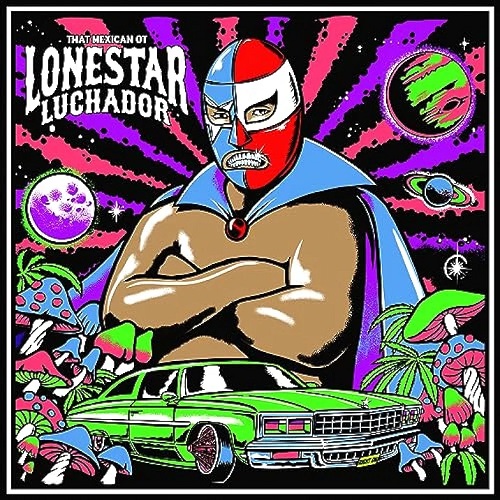We should never forget that, originally, hip-hop was also a Latino art. The ghettos where it was born, in New-York, were not only inhabited by African Americans, they also had Spanish speakers. And overtime, many rappers of such origin contributed to shaping it. How would have rap music looked like without Cypress Hill, Big Pun and others? These people had so much impact, that at one step of time, I was planning to write a book about Latino rap. But that won't be needed as, regularly, new rappers remind others about their roots and culture, like That Mexican OT.

Virgil René Gazca filled Lonestar Luchador with Mexican sounds - and more particularly the shouts of mariachis. Contrary to the boring protestants from the North, he likes colors and extravaganzas, his music is playful and humorous, and he has a passion for flamboyant wrestlers. Throughout various skits, we get to know people with names as fancy as El Puerko Azul, or The Invisible Masturbator, people whose sport is similar to MC battles, those lyrical contests that, quite visibly, educated That Mexican OT to rap.
Latino rappers brought to hip-hop influences that are foreign to Black Music. There's been a bit of rock and folk music, on records from Cypress Hill, the Mexakinz, and a few underground rappers we used to love down here, such as 2Mex, Xololanxinxo, and Ceschi. And That Mexican OT is no exception with the guitars on the love lament "Breannan", the bluesy and pornographic "15 Missed Calls", and "Be Careful Texas", about traumas such as the death of Virgil's mother, when he was only eight. A guitar also shows up on "Barrio", the most Hispanic song of all, a bilingual track delivered with Mexican rapper Lefty Sm.
Lonestar Luchador celebrates the rapper's Latin identity, but also his allegiance to the scene he belongs to. The "OT" in That Mexican OT means "outta Texas", and the "Lonestar" in the title refers of course to a certain flag. No US State, indeed, is as imbued with Mexican culture as Texas. And some peculiarities of its rap scene, for example its visceral passion for cars, may come from the bordering country's immigrants.
On the conclusive and quite good "Matagorda", That Mexican OT says that anyone could tell that he is a pure Texan, just by the way he talks. As soon as on the first real track, "Skelz" – a display of rap skills divided into two parts – he explores the Houston mythology: strip clubs, nice cars, and codeine. And elsewhere, he wanders in the 'hoods as if he was in a western movie.
Logically, the album has one screwed and chopped track, "OMG". And a few other locals join the party, such as Paul Wall and Maxo Kream, as well as a Dallas Texan, BigXthaPlug. The "Johnny Dang" banger is a tribute to an iconic jeweler of the city, known for his grillz. And on "Cowboy In New York", even when the rapper uses – successfully – the colder style of the East Coast, he remains exactly that, a cowboy: a man with a gun in his hand, ready to hang high his opponents.
With this uplifting Lonestar Luchador, That Mexican OT delivers another piece of Houston rap music, and a new milestone in the rich history of Latino hip-hop.
